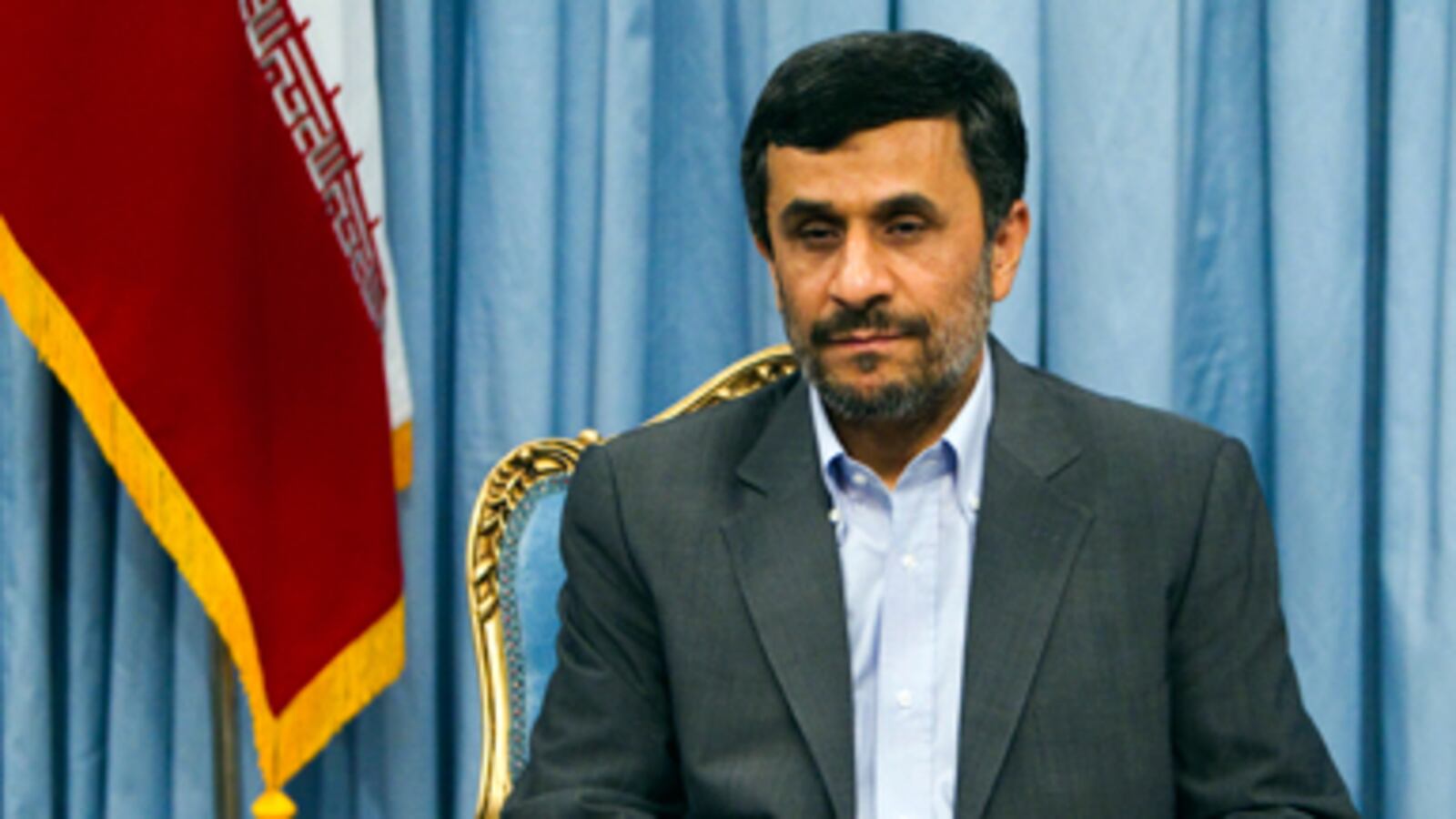As the world has been watching the Arab Spring in full bloom, Iran’s streets have been seemingly quiet since its own wave of protests in 2009, after President Mahmoud Ahmadinejad’s allegedly fraudulent election. But in Tehran, the astonishing and ever-increasing criticism coming from conservatives against the president is entering a new stage, which according to some sources, could turn into a bloody duel in Iranian politics over the coming weeks.

Ahmadinejad and the supreme leader, Ayatollah Ali Khamenei, have come to a head in recent months as Ahmadinejad has blatantly made controversial decisions against the leader’s wishes. A political activist close to the recent struggles told The Daily Beast that the Iranian president has not only lost Khamenei’s unconditional support, but the leader has also let Ahmadinejad's opposition loose on him.
Analysts say Ahmadinejad has made a lot of enemies over the past five years and has failed to build political coalitions during his time in power. He has practically brought isolation for himself and Iran internationally. And inside the country, his delusional ambitions for a power grab that could engulf the leader’s territory has resulted in a very strong backlash.
“Ahmadinejad’s emotional and delusional actions may also lead to his demise, because power plays in Iran are extremely ruthless and the security forces in the leader's camp are known to confront mercilessly.”
“After Mahmoud Ahmadinejad changed his Foreign Minister [ Manouchehr Mottaki] without the leader's approval and appointed his own candidate in his place, the alarm went off for the Iranian leader,” a political activist in Tehran aware of the conversations told The Daily Beast on the condition of anonymity. “At a meeting with high state officials, the Iranian leader gave the green light for the pursuit of violations committed by those close to Ahmadinejad.”
Last month, Ahmadinejad also dismissed his cabinet's intelligence minister. But Khamenei opposed the president's action and asked him to change his decision. Although the supreme leader holds the final call on all critical decisions, Ahmadinejad insisted on his decision and refused to attend cabinet meetings for 10 days—10 days that helped a storm of criticism brew against him. He finally gave up and admitted the intelligence minister back into his cabinet.
“It is easier to predict the leader's game. But it is difficult to predict how Ahmadinejad would continue the game, as he behaves emotionally and unpredictably,” said Reza Alijani a prominent political analyst who has recently fled Iran. “Ahmadinejad’s emotional and delusional actions may also lead to his demise, because power plays in Iran are extremely ruthless and the security forces in the leader's camp are known to confront mercilessly.”
The intelligence minister was apparently dismissed when he attempted to install surveillance equipment to tap the conversations of Esfandiar Rahim Mashaei, Ahmadinejad's chief of staff and closest, most trusted adviser. Many say there is no doubt the tapping was done on orders from the leader.
Over the past few weeks, several people close to Mashaei have been arrested, and government opposition groups attacked his deputies. But analysts in Iran believe that this is just the beginning of what is expected to include the arrests of Mashei himself and several other authorities close to the president.
Just last week, Iranian media reported the conviction of Hamid Baghaei, Ahmadinejad's vice president, on charges of numerous violations during his tenure as Head of Iran Cultural Heritage, Handicraft and Tourism Organization. Baghaei was found guilty by the administrative Court and sentenced to four years' discharge of government positions. Ahmadinejad has not yet reacted to the systematic attacks against his team.
In early May, Ahmadinejad integrated several ministries and dismissed the oil minister, assuming oversight responsibilities for the oil ministry himself. This move sent a serious shock through Iran's political system. The powerful Guardian Council opposed the decision and the supreme leader took sides with the Guardian Council. The Council is responsible for approving the parliament's decisions and coordinating the government's decisions with Iran’s constitution and Sharia laws. Ahmadinejad paid no attention to the disapproval.
The move also sparked ire in frustrated parliament members who no longer fear losing the supreme leader's support if they attack Ahmadinejad. Last week, influential conservative MP Ahmad Tavakoli, Head of the parliament's research center, said that the parliament would stand up to Ahmadinejad, in an interview with the conservative Fars News Agency.
"Mr. Ahmadinejad thought that he could do whatever he deemed right but today's circumstances have changed, as both Mr. Ahmadinejad is not the same old Mr. Ahmadinejad, and the country no longer tolerates certain violations of the law," he said.
"Right now, if you look at the main individuals around Dr. Ahmadinejad, they are either deviants or are accused of financial corruption, or both," added Tavakoli, who is close to the supreme leader’s camp.
Just last Friday, May 20, a high-ranking IRGC (Iran’s Revolutionary Guard Corp) commander said that the Basij force is preparing itself for "preventive action" against "the deviant trend." The "deviant trend" is a title used by those who oppose Ahmadinejad to describe certain people close to him, including Mashaei. The IRGC commander said that they would hold a military maneuver to show their allegiance with Iran's supreme leader.
But why has Ahmadinejad stayed quiet in the face of increasing criticism and pressure? Some say he’s biding his time. He could either be preparing to mount an attack. Or, some speculate, he is expecting Khamenei, who is rumored to be struggling with cancer, to lose that fight. This back and forth between Ahmadinejad and Khamenei’s camps have been taking place very publicly, even on websites such as Ya Lesarat, a pro-leader conservative site.
One of the individuals said to belong to the “deviant trend” is Esfandiar Rahim Mashaei. The "deviants" believes in the emergence of Mahdi, the Twelfth Imam of Shia Muslims. According to Shia teachings, the Vali-e Fagheeh, currently Iran's supreme leader, represents the Twelfth Imam, Mahdi, at this time. But with the emergence of the Twelfth Imam himself, the Vali-e Fagheeh, or Iran's supreme leader, will be ousted from power. In fact Ayatollah Khamenei's supporters and the traditional conservatives are worried that Ahmadinejad's disobedience of the supreme leader's orders may be a part of his long-term plans for creating fundamental changes in the Iranian political scene whereby the Iranian leader will no longer have a role.
“The leader who regards Ahmadinejad's cabinet his own, wishes the remaining two years of the cabinet's term to end with maximum tolerance,” said Alijani. “Now the leader kills time in his game, but Ahmadinejad plays with speed, as he has no time left and this is how the previous win/win game turns into a win/lose game which would eliminate one side.”
"His 'use-by date' has expired, but he wishes to pull some others down with him as he drowns. At this time the struggle is over some people's staying and not drowning with him. I believe Mr. Ahmadinejad cannot continue and his cabinet will fall," said Mehdi Khazali, son of an influential Ayatollah in an interview with Deutsche Welle Persian last week. Unlike his father, Khazali is considered a government critic.
"In the balance of power in Iran, the leader holds the absolute power. The Basij, the IRGC, the parliament, and the bazaar all support Khamenei. The reason for these establishments' support of Ahmadinejad for the past five years was because of the leader's unconditional support of him,” said a former aide to former President Khatami. “Now that it seems he has abandoned his support, they will pull back their support, too," said a political activist.”
Even so, it seems very unlikely that Ahmadinejad, supported by billions of dollars of oil revenues, backing of sections of religious and military forces, and five years of continuous suppression, will give in so easily. That is why the struggle between the supreme leader and Ahmadinejad and their allies will be a bloody battle over the coming weeks and months, presenting a low probability for the controversial Iranian president's safe passage.
Omid Memarian is columnist whose writing has appeared in The New York Times, The Los Angeles Times, The San Francisco Chronicle and other publications. He was a World Peace Fellow at the UC Berkeley Graduate School of Journalism in 2007-2009 and the 2005 recipient of the 'Human Rights Defender Award', the highest honor bestowed by Human Rights Watch.






